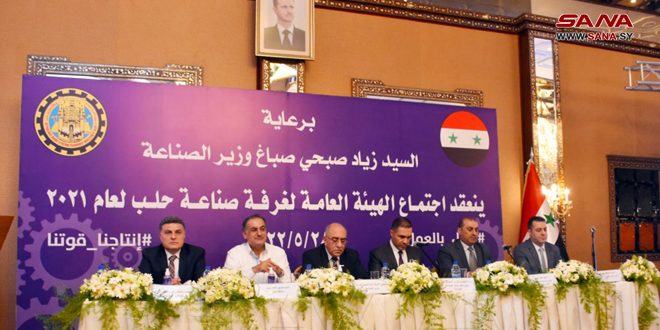 During the annual general assembly, members of the Aleppo Chamber of Industry demanded an increase in electricity supplies to the industrial zones and cities.
During the annual general assembly, members of the Aleppo Chamber of Industry demanded an increase in electricity supplies to the industrial zones and cities. They also called to ensure industrial production requirements of raw materials, especially cotton yarn, and permissions to import them.
They called to secure markets for external export, work to develop specifications and standards, reconsider the imposed customs duties, simplify procedures for obtaining import licenses, and limit the rise in the price of raw materials for the production.
Minister of Industry Ziad Sabbagh stressed the importance of the industrial sector and joint work to advance it and increase production to confront the economic blockade.
Minister of Industry Ziad Sabbagh pointed to that coordination among the ministries, the Federation of Chambers of Industry and Commerce and economic activities to secure energy supplies and provide electricity to industrialists.
The Governor of Aleppo, Hussein Diab, reviewed the efforts made by the governorate to serve the industrial zones and cities bycontinuing to remove rubble, open roads, and coordinate with the heads of the industrial committees to deliver electricity, which contributes to increasing production.
The head of the Aleppo Chamber of Industry, Faris Al-Shihabi, pointed to the need to provide the requirements of the production process, open new markets for export, and provide support to the industrial sector to confront the conditions of the siege.
During the meeting, 300 million Syrian pounds were allocated to implement service projects and improve infrastructure in the industrial zones and cities, including 200 million pounds provided by Aleppo City Council and 100 million pounds from Aleppo Chamber of Industry.
A number of industrialists in various sectors of the engineering, textile, chemical and food industries were honored and shields were presented to them in appreciation of their efforts to increase production.
A short film was presented about the activities of the Chamber of Industry, conferences and exhibitions organized by it, and training and qualification courses.
The Minister of Industry had visited the Ministry of Industry’s vocational training center in the Maysaloon district and the leather industry training center.
In turn, the Director of the Vocational Training Complex in Aleppo, Eng. Basel Hosari, explained that the center includes four departments, and during the past two years 325 trainees have been graduated who entered the labor market in the private sector, as well as training of 71 teachers from the vocational training complexes in Syria in cooperation with the Ministry of Education and universities.
Inas Abdulukareem

